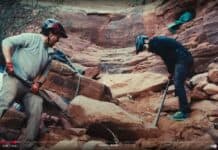Until three years ago, the topic of short-term vacation rentals wasn’t on the mind of many Arizonans. That’s since changed.
As more and more homes become vacation rentals, those for and against the practice have become more vocal. Thoughts from those for and against the issue were expressed during a four-hour joint ad hoc Arizona legislative meeting on Oct. 30 in Phoenix.
This meeting was one of three scheduled in the next two or three months on the topic. Discussion was limited to the potential nuisance aspect of short-term rentals. Dates for the subsequent meetings have yet to be set.
During videotaped testimony, which didn’t appear on the state’s website until eight days later, several invited guests were asked to speak on both sides of the issue followed by more than an hour of public comments, which included Sedona-area residents.
Arizona Rep. John Kavanaugh [R-District 23], the committee’s co-chairman, said he was one of the few legislators that
voted against Senate Bill 1350, which became effective on Jan. 1, 2017, after being signed into law by Gov. Doug Ducey in 2016.
“There are municipal level issues where the number of short-term vacation rentals has become extremely large and the concentrations have become extremely dense,” he said. “I think Sedona would be the poster child for that issue because it’s having some effect on the availability of long-term rentals for people who want to work in Sedona.”
Matt Miller, an attorney for the Goldwater Institute, a libertarian think tank, said the organization he represents would be opposed to overturning Senate Bill 1350. He also said that while there are bad apples in terms of short-term renters and those homeowners, that assertion also applies to long-term renters and homeowners in general. Goldwater Institute representatives say they are not opposed to laws as long as they are applied to all renters and not simply short-term.
“Repeat bad actors are not that difficult to identify or to keep tabs on and everyone quickly learns who they are,” he said. “If someone is running a party house and is disturbing the neighborhood, the answer is to drop the hammer on that person and their guests. It’s not to destroy the ability of responsible owners and renters who take advantage of all the benefits short-term rentals offer.”
Lake Havasu City Mayor Cal Sheehey said the biggest complaint he receives from his residents is short-term vacation rentals.
“For my community specifically, there is a place in the market for vacation rentals if we have, as cities, the ability to manage them — which we did prior to the 2016 bill that was passed,” he said. “Now we don’t have that ability and we have to deal with whatever was preempted by state law.”
Randy Durow, who with his wife owns nine short-term rental properties in the Phoenix area, said everyone should give Senate Bill 1350 time to work.
“The free market is going to kick in,” he said. “I get calls weekly from people saying they want to sell their properties because they just can’t make a go of it [as a short-term vacation rental owner]. It’s really competitive right now. If you’re going to have a trashy vacation rental that’s not run well, you’re going to go out of business. I think if you give it time, the abundance of these are actually going to be reduced and the good are going to survive.”
Durow also referenced House Bill 2672, which Ducey signed earlier this year and went into effect in September. It’s designed to allow municipalities to crack down on party houses.
Upon his signing of HB 2672, Ducey said that local governments may enforce rules related to building codes, traffic control, noise, zoning and other areas that ensure that neighborhoods stay safe and pleasant for those full-time residents.
“Most short-term rental homeowners are good neighbors,” the governor said. “HB 2672 provides a straight-forward enforcement mechanism to penalize ‘party house’ operators for not upholding the laws on their properties.”
Sedona Councilman Scott Jablow gave testimony and the following day looked back on the hearing.
“It was interesting to see that many of the negative impacts that Sedona has been experiencing are shared by many other cities such as Paradise Valley. Lake Havasu City and Jerome,” he said.
Jablow went on to add, “What was very evident to me by attending this meeting was the state’s short-term rental legislation was crafted by the Goldwater Institute. Matt Miller, a Goldwater attorney, gave a 15-minute presentation where he showed that his organization was more interested in the rights of property owners than the rights of the surrounding neighbors and the effects that short-term rentals have on cities and town resources and the statewide loss of workforce housing.”
Nick Ponder, the legislative director for the League of Arizona Cities and Towns, said following the meeting that it was clear that a majority of the members on the ad hoc committee understand the short-term rental issues communities are facing.
“We had a robust discussion about the benefits and challenges of short-term rentals and look forward to the next two meetings to discuss the proliferation of short-term rentals in our communities and recommendations,” he said. “We’re optimistic that we can find a balance between the property rights of owners operating a single short-term rental and those who live in our communities and have to live near these properties.”





















